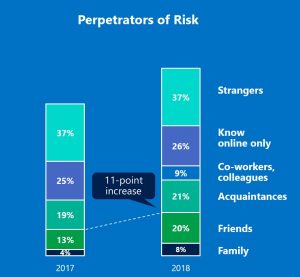New Microsoft research shows people's online social circles riskier
- Live the Golden Rule by acting with empathy, compassion and kindness in every interaction, and treating everyone you connect with online with dignity and respect.
- Respect differences, honor diverse perspectives and when disagreements surface, engage thoughtfully, and avoid name-calling and personal attacks.
- Pause before replying to things you disagree with, and don’t post or send anything that could hurt someone, damage reputations or threaten someone’s safety.
- Stand up for yourself and others by supporting those who are targets of online abuse or cruelty, reporting threatening activity and preserving evidence of inappropriate or unsafe behavior.
- Reputational – “Doxing” and damage to personal or professional reputations
- Behavioral – Being treated meanly; experiencing trolling, online harassment or bullying; encountering hate speech and microaggressions
- Sexual – Sending or receiving unwanted “sext” messages and making sexual solicitations; receiving unwanted sexual attention – a new risk added in this latest research, and being a victim of sextortion or non-consensual pornography (aka “revenge porn”), and
- Personal / Intrusive – Being the target of unwanted contact, experiencing discrimination, swatting, misogyny, exposure to extremist content/recruiting, or falling victim to hoaxes, scams or fraud.
New Microsoft research shows people's online social circles riskier
Posted: 13 Nov 2018
Bullying, unwanted contact and receiving unwelcome sexual images and messages were the most prominent risks in our latest digital civility research and, while strangers still pose the majority of online threats, data show a distinct rise in risk-exposure from people’s own social circles.
According to preliminary results from our latest study, 63 percent of online risks were sourced from strangers and people whom respondents knew only online – largely unchanged from the previous year. Meanwhile, 28 percent of online risks came from family and friends, up 11 points. In addition, findings revealed a relationship between risk-exposure and familiarity with the perpetrator: respondents who had met their abuser in real life were almost twice as likely to experience an online risk. More disheartening were indications that people were targeted because of their personal characteristics, namely gender, age and physical appearance.
These are some early findings from Microsoft’s latest study, “Civility, Safety and Interactions Online – 2018,” which measured attitudes and perceptions of teens and adults in 22 countries[1] about the online risks they face[2] and how their interactions impact their lives. As with previous years’ surveys, full and final results will be made available on international Safer Internet Day on Feb. 5. We chose to make these results available today in conjunction with World Kindness Day to emphasize the need for more civil and respectful interactions both online and off.
Examining the risk categories: Reputational, behavioral, sexual and personal/intrusive
In 2017, results showed that people’s digital interactions and responses to online risks appeared to be improving, but what was surprising was that many of those targeted for abuse said their offenders came from their immediate families and social circles. We decided to take a closer look at some of these findings this year and we found that unsettling trend was continuing. Indeed, negative experiences from family, friends and acquaintances were up 4 percent, 7 percent and 2 percent, respectively, while a new classification of perpetrators – colleagues and coworkers – accounted for 9 percent of people’s unpleasant interactions online.
As for the nature of online risks across and within the four risk categories – reputational, behavioral, sexual and personal/intrusive – 40 percent of respondents experienced behavioral risks and unwanted contact (a personal and intrusive risk); just over one-third (34 percent) reported negative experiences of a sexual nature, and 28 percent said they fell victim to hoaxes, scams or fraud, another personal and intrusive risk. Interestingly, 60 percent of those who experienced a behavioral risk also experienced unwanted contact and, coincidentally, 60 percent of those who experienced unwanted contact also experienced a behavioral risk.
Bullying seemed to define the behavioral category. Nearly all respondents who reported experiencing a behavioral risk was a target of name-calling, purposeful embarrassment or some other form of bullying. Unwanted contact was characterized by repeated attempts to contact the target, with more than four in 10 respondents reporting at least one form of repeated unwanted contact. Receipt of unwelcome sexual imagery and messages dominated the sexual risk category, with another nearly four in 10 experiencing repeated attempts to start a romantic relationship. Finally, the commonly experienced hoaxes, scams and fraud risk was led by false and misleading information. Fake news and internet hoaxes were the most common type, far outpacing fake anti-virus scams. More detailed findings across all of these individual risks and risk categories will be released on Safer Internet Day 2019.
Get ready for Safer Internet Day 2019: Pledge to be more respectful online
On World Kindness Day and in gearing up for Safer Internet Day, we’re again encouraging global internet users to pledge to engage responsibly online. Follow the example of the 15 impressive teens that served on our inaugural Council for Digital Good, and take our Digital Civility Challenge:
Find more great advice from our council members here, and visit our website and resources page for help in handling almost any online safety situation. For more regular news and information, you can connect with us on Facebook and Twitter. However you choose to learn and get involved, make this World Kindness Day count when it comes to safer and healthier online interactions.
[1] Countries surveyed: Argentina, Belgium, Brazil, Canada*, Chile, Colombia, France, Germany, Hungary, India, Ireland, Italy, Malaysia, Mexico, Peru, Russia, Singapore*, South Africa, Turkey, the United Kingdom, the United States and Vietnam. (* Indicates the first time this country has been included in this research.)
[2] In the latest study, the 21 risks break down as follows:
Source: People's online social circles are becoming riskier, new Microsoft research shows - Microsoft on the Issues
Related Discussions

